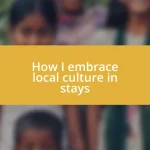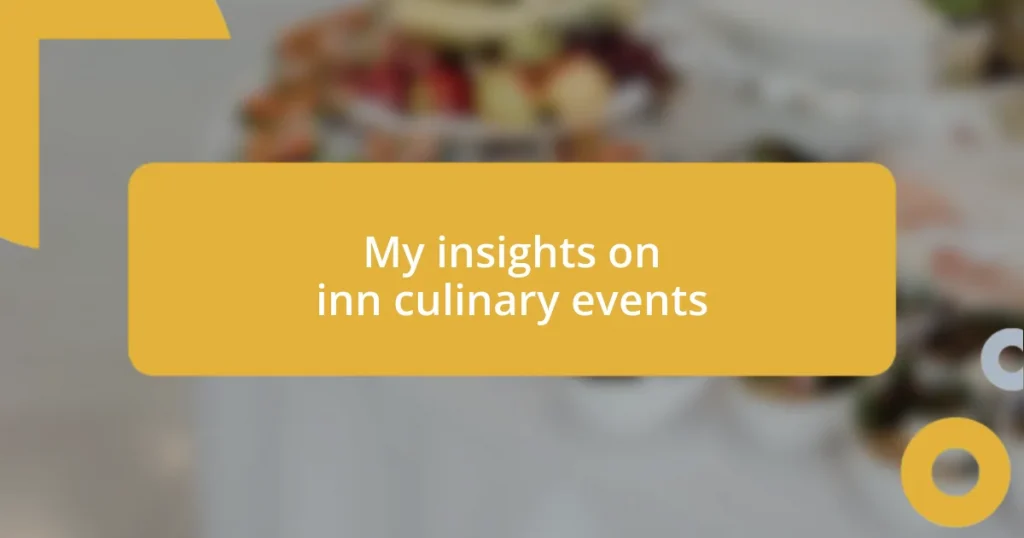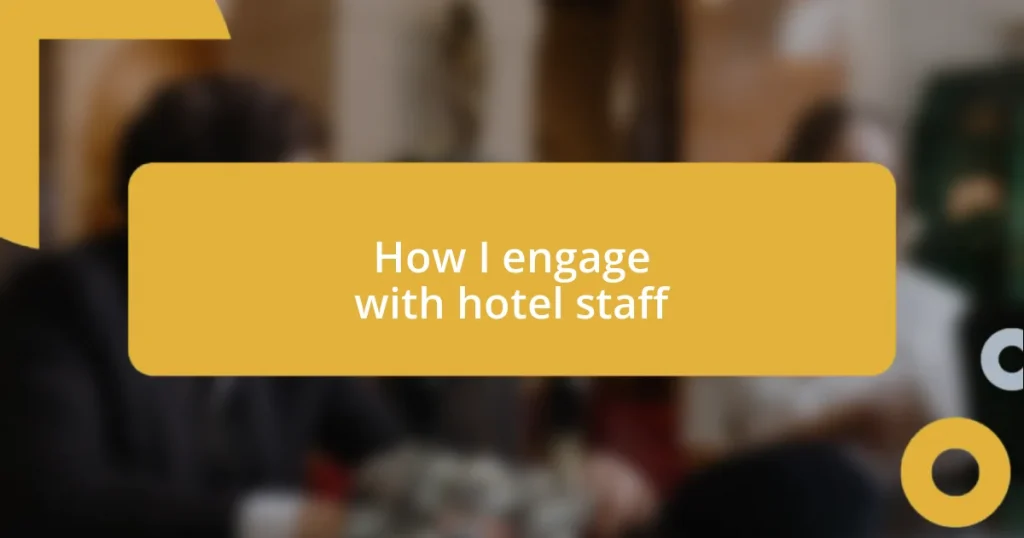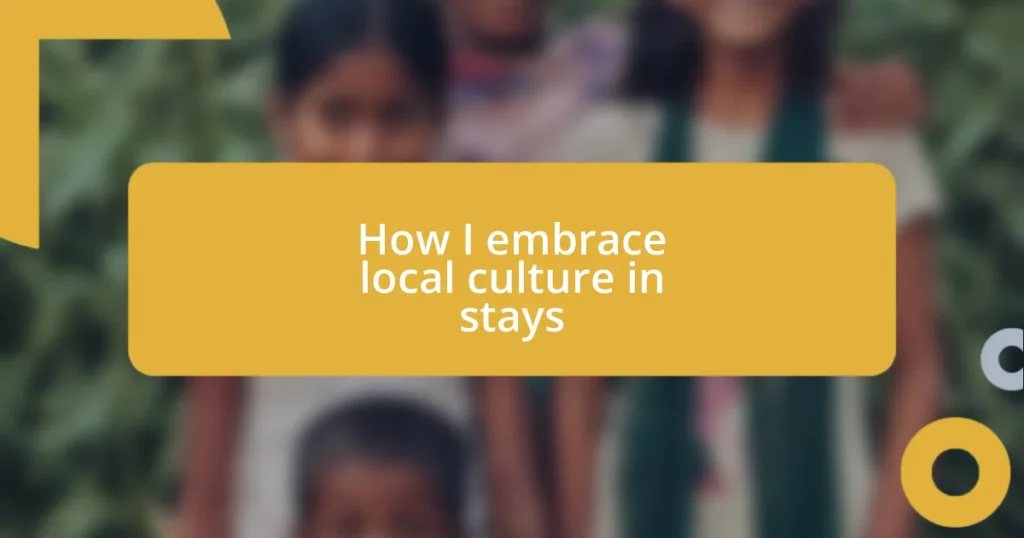Key takeaways:
- Culinary events foster cultural exchange, networking, and inspiration, enhancing attendees’ appreciation for food and creating lasting connections.
- Engaging with guests through storytelling and interactive experiences enhances their enjoyment and fosters community, making culinary events memorable.
- Effective promotion through social media, influencers, and community engagement can significantly increase visibility and attendance for culinary events.
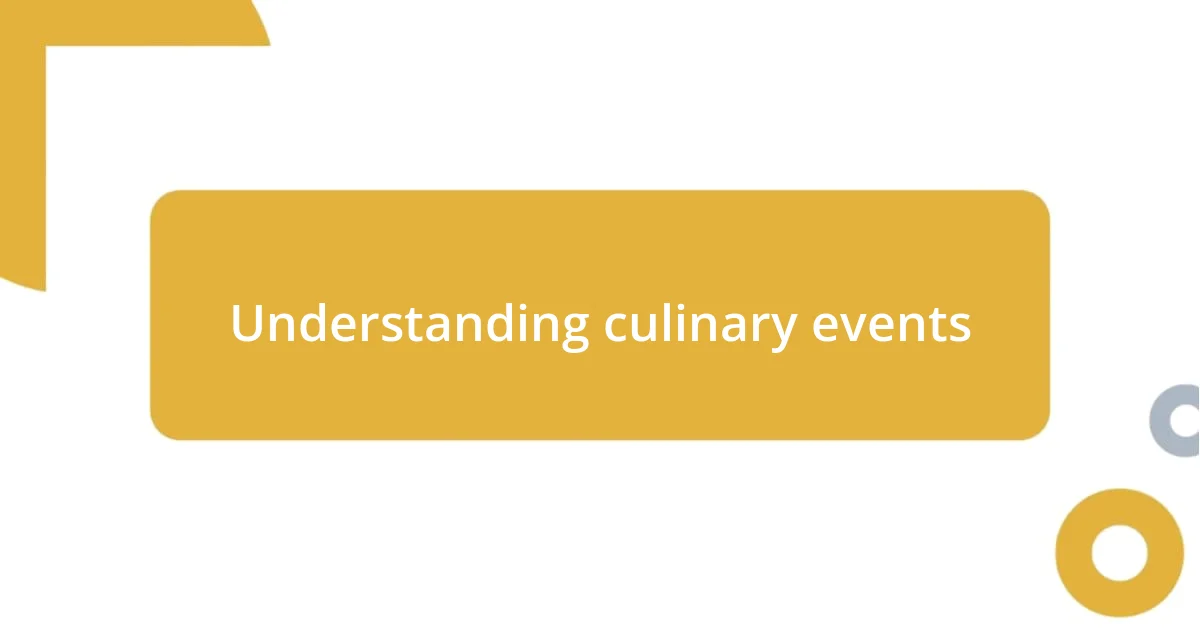
Understanding culinary events
Culinary events are fascinating gatherings that bring food enthusiasts together to celebrate and explore diverse cuisines. I remember attending a local food festival where I could taste everything from artisanal cheeses to gourmet tacos. The energy in the air was palpable, with chefs sharing their passion while inviting attendees to dive into their creations.
What truly excites me about these events is the interaction; it’s not just about eating but connecting with others who have a shared love for food. Have you ever found yourself in a conversation with a stranger over a dish you both adore? It’s amazing how food can bridge gaps and create genuine connections. At one event, I struck up a chat with a pastry chef, and what started as a simple compliment turned into a deep discussion about her creative process.
Moreover, culinary events often serve as a platform for innovation, showcasing not only traditional dishes but also modern twists. This really makes me ponder how food evolves with culture. I once attended a pop-up dinner where the chef combined molecular gastronomy with local ingredients, creating an extraordinary experience that challenged my perceptions of flavor and technique. It’s inspiring to see how chefs push boundaries and invite us to reimagine what food can be.
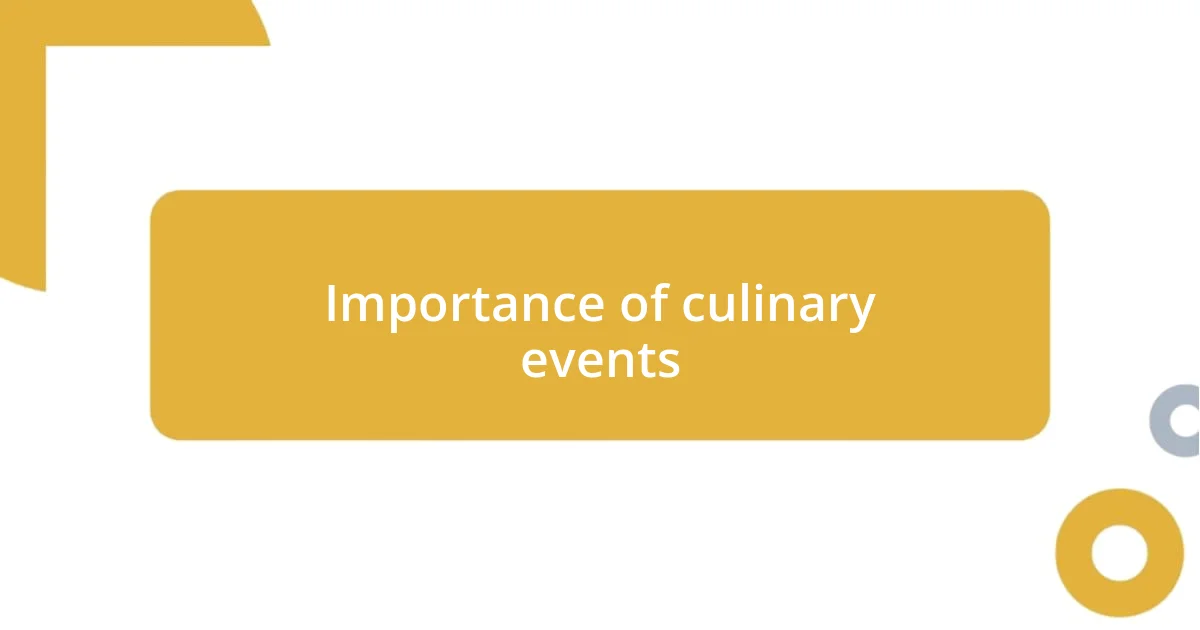
Importance of culinary events
Culinary events hold a significant place in the culinary world. They aren’t just gatherings; they’re unique opportunities for learning, tasting, and connecting. I once participated in a wine and food pairing event where I not only learned about the nuances of complementary flavors but also met several passionate sommeliers. Sharing those experiences elevated my appreciation for both food and drink, reminding me that learning happens in the most delightful settings.
Key importance of culinary events:
- Cultural Exchange: They allow participants to discover and celebrate diverse food traditions, enriching our culinary landscapes.
- Networking Opportunities: For professionals, these gatherings foster connections that can lead to collaborations or career advancements.
- Inspiration for Home Cooks: Attendees often leave with new techniques and ideas to try in their own kitchens.
- Support for Local Producers: Many events highlight local producers, promoting regional ingredients and sustainable practices.
- Community Building: They create a sense of belonging among food enthusiasts, sparking ongoing friendships and discussions that extend beyond the event.
I find it incredible how a simple dish can spark such lively discussions and foster relationships. For instance, at a recent gourmet festival, I bonded over a shared love for truffle-infused dishes with a fellow attendee. We exchanged tips and favorite recipes, a reminder that culinary events can become the catalyst for lasting connections and shared passions.
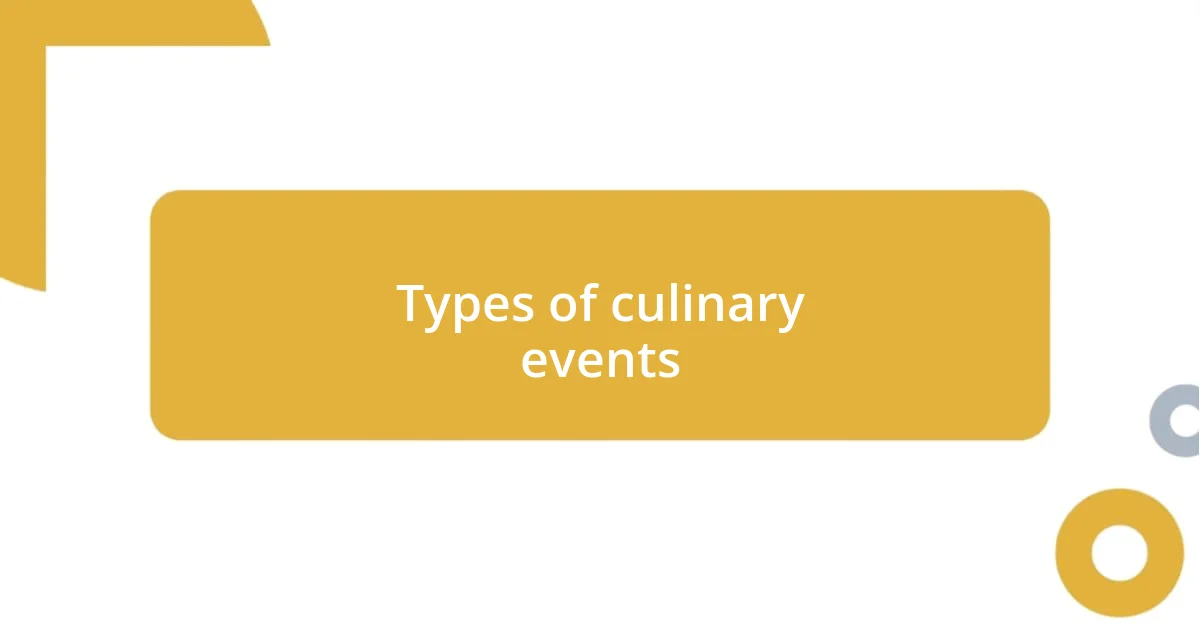
Types of culinary events
Culinary events can vary widely in their formats and themes, creating a tapestry of experiences for food lovers. For instance, food festivals typically showcase food trucks, local vendors, and a diverse range of dishes, all in a vibrant setting. I vividly recall attending an annual seafood festival where the ocean’s bounty was front and center—everything from spicy crab bites to succulent grilled shrimp. The atmosphere was festive, and as I chatted with vendors, I discovered fascinating stories about their sourcing practices.
On the other hand, cooking classes are a more intimate experience, allowing participants to learn directly from chefs. I participated in a hands-on session focused on Italian cuisine, where I learned not only how to make the perfect pasta but also the history behind each dish. It was enlightening to hear the chef’s passion for traditional cooking methods, and I left with tips that transformed my home cooking. This type of event not only enhances your skills but also fosters a connection with culinary traditions that I find both valuable and inspiring.
Lastly, tastings or pairing events allow enthusiasts to delve deeper into specific aspects of food and drink. I attended an olive oil tasting where we sampled a variety of oils and explored their flavor profiles. What struck me was how each sample conveyed its story—from the region it came from to the type of olives used. I often think these events offer an immersive learning experience that can elevate one’s appreciation for food. After all, experiencing food through taste, aroma, and context creates a multi-sensory celebration that stays with you long after the event is over.
| Type of Culinary Event | Description |
|---|---|
| Food Festivals | Vibrant gatherings featuring diverse foods from local vendors, often accompanied by entertainment. |
| Cooking Classes | Intimate sessions where participants learn cooking techniques and recipes directly from chefs. |
| Tastings/Event Pairings | Focused experiences exploring specific foods or drinks, enhancing understanding and appreciation. |
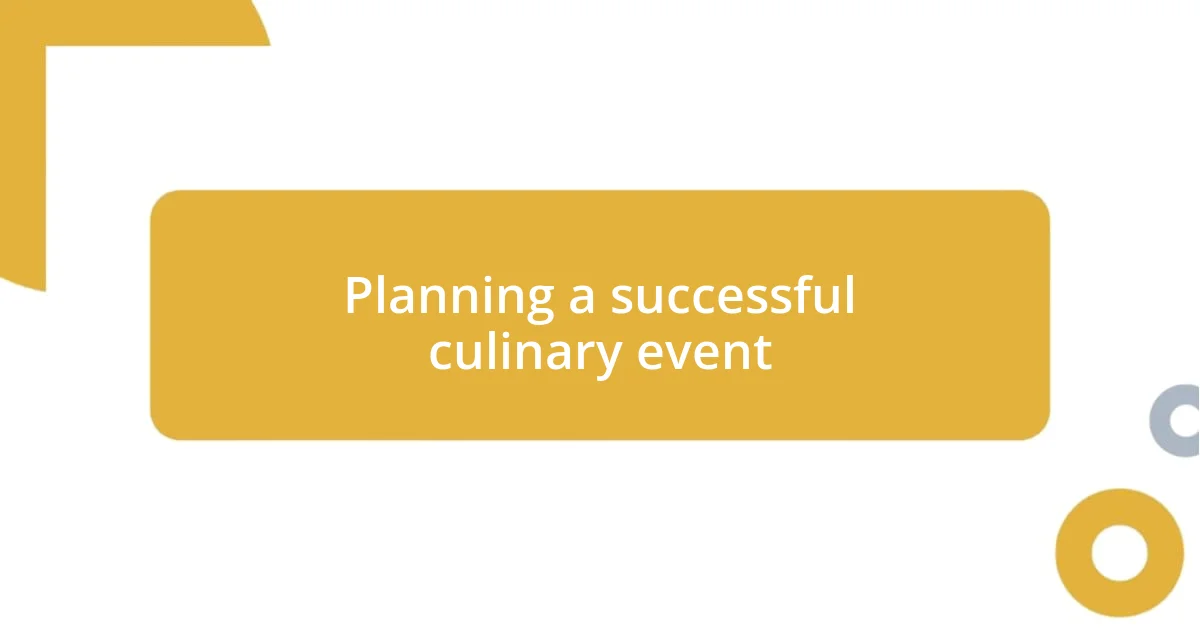
Planning a successful culinary event
Planning a successful culinary event requires a clear vision and meticulous attention to detail. I remember organizing a charity dinner where the aim was to create an unforgettable dining experience while raising funds. By carefully selecting the venue, menu, and even the décor, I found that each element played a crucial role in setting the right ambiance. Have you ever noticed how the lighting can completely change the mood of an event? I certainly did, and it made all the difference.
Logistics can often feel overwhelming, but I’ve learned that preparation is key. For that same charity dinner, I created a checklist that included everything from seating arrangements to the timing of courses. This might sound tedious, but believe me, it was vital. The night flowed seamlessly, and it brought such joy to see guests enjoying themselves, knowing I had orchestrated the experience. How often do you find that planning helps things go more smoothly? From my experience, it really is the backbone of a successful event.
Lastly, engaging with your audience is essential for any culinary gathering. I’ve found that personal touches, like sharing stories about the dishes or having chefs interact with attendees, foster a sense of connection. During one event, I invited the chef to explain how they sourced ingredients from local farmers, and the audience truly appreciated that insight. I noticed smiles and nods all around as people savored their food, and it struck me how storytelling can elevate the dining experience. It makes one wonder, doesn’t it? How can we create even deeper connections through food?
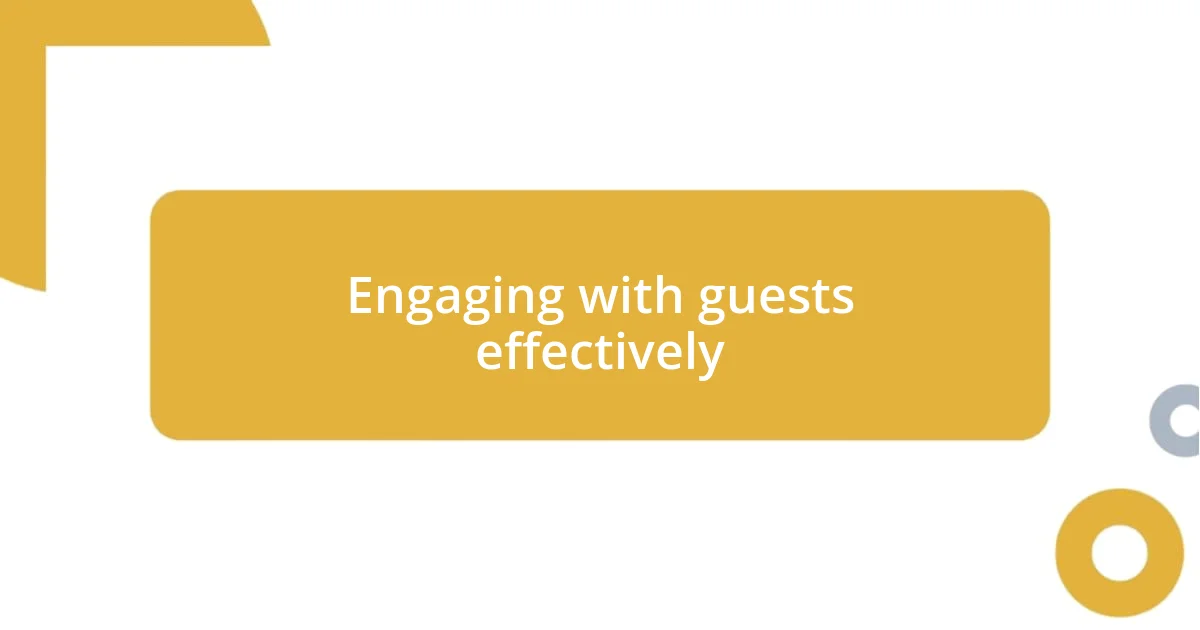
Engaging with guests effectively
Engaging effectively with guests at culinary events is more than just serving food; it’s about creating an experience that resonates. I remember a farm-to-table dinner where the host introduced each dish with a story about its ingredients—like the heirloom tomatoes grown by a local farmer. It was fascinating to see how those personal connections sparked conversations among guests, drawing them closer together. Isn’t it incredible how food can bridge gaps and foster community?
Another time, I attended a wine and cheese pairing event where the sommelier walked us through each selection. Not only did he share fun facts about the wines, but he also encouraged questions, making it feel like a casual chat among friends. I found that this interactive approach kept everyone engaged and eager to learn more. How often do you get the chance to dive deeper into the pairings you love? From my perspective, inviting guests to participate transforms the atmosphere, allowing them to feel invested in the experience.
I’ve also learned that the little details can make a big impact. At a barbecue event I once helped organize, we had a chef do live demonstrations while guests mingled. Seeing the grilling process, the sizzling sounds, and the aromatic smokiness created a lively energy. It turned dinner prep into a performance rather than a mundane task. Have you ever thought about how engaging and entertaining a cooking demonstration can be? It’s these memorable touches that stick with attendees and enhance their overall enjoyment.
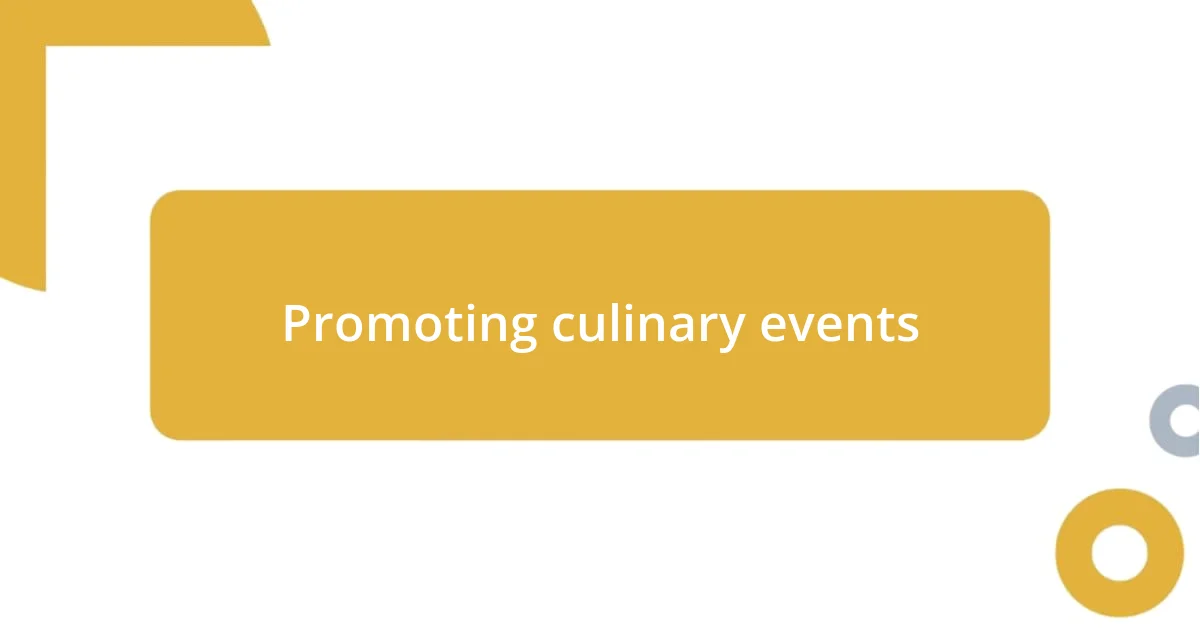
Promoting culinary events
Promoting culinary events effectively is about crafting a narrative that resonates with potential attendees. I recall the vibrant launch of a local food festival where the organizers used social media stories to tease unique dishes and interviews with chefs. It felt electric seeing the buzz build online, and it really highlighted how storytelling can draw in an audience. Have you ever found yourself excited by a simple post that teased an upcoming event? I certainly have, and it ignites a sense of anticipation that’s hard to beat.
Another avenue I’ve explored is partnerships with local influencers and food bloggers. There was an event where I collaborated with a well-known food writer, and it turned our gathering into a social media sensation. The influencer shared stunning photos and live updates throughout the night, making followers feel like they were part of the experience. I think it really raises the question: how can we leverage these connections for wider exposure? In my experience, tapping into different networks can exponentially increase visibility and excitement around an event.
Lastly, I’ve realized that attending community events can enhance promotion efforts. During a local farmers’ market, I set up a booth to showcase my upcoming culinary event. Engaging directly with people, answering questions, and offering samples created a personal connection that flyers alone couldn’t achieve. Do you ever find that face-to-face interactions leave a lasting impression? For me, it was clear that building relationships at community gatherings can effectively drive interest and attendance.

Evaluating event success
Evaluating the success of culinary events extends beyond just headcounts or revenue; it’s about gathering meaningful feedback. I remember after hosting a themed dinner, I created a simple survey for guests to share their thoughts. The insights were invaluable—some found the music too loud while others loved it! Reflecting on their feedback, I realized how even minor adjustments could elevate future experiences. Isn’t it fascinating how a few voices can guide us toward improvement?
During another event, I took the time to observe guests’ interactions. People lingered by the dessert table, while the cocktail station was bustling. This informal observation taught me that the appeal of certain offerings can be just as crucial as the overall menu design. Have you ever noticed how certain dishes or activities draw crowds while others fade into the background? Recognizing these trends helps me tailor future events to what truly resonates with attendees.
Moreover, I’ve found that making personal connections post-event can significantly impact evaluations. A few days later, I followed up with attendees through email, thanking them and asking for their favorite moments. One guest mentioned the gelato cart, which sparked a vibrant conversation about homemade flavors. This not only deepened my relationship with them but also provided key insights into what they enjoyed the most. When you think about it, isn’t getting personal feedback an essential part of building a community around your events?

